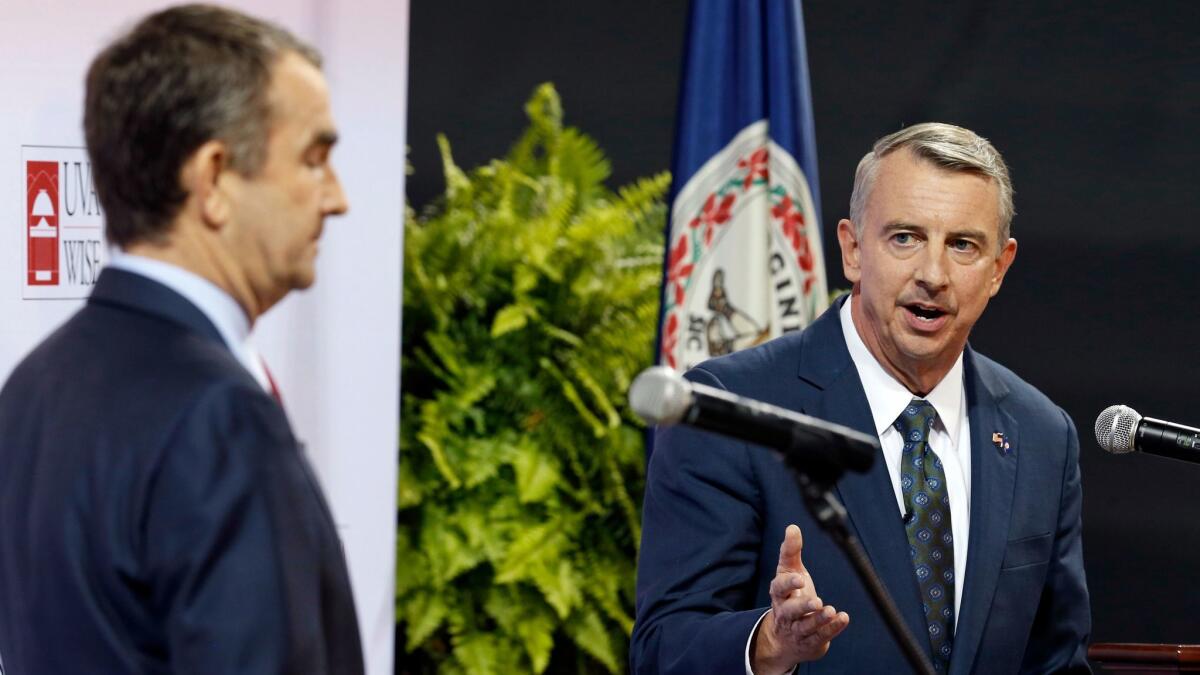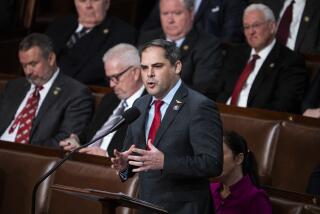Virginia tests a likely 2018 election strategy: Racially fraught appeals

- Share via
Reporting from Washington — Virginia has been swamped by fearful images as Tuesday’s state elections near: heavily tattooed and handcuffed Latinos staring balefully at the television camera, a mug shot of a convicted pedophile set loose on the state.
Versions of those ads may be headed to other states in the 2018 elections, as Republicans seek to maximize the turnout of the burgeoning Trump wing of the party with themes known to appeal to them.
The strategy in Virginia by Republican gubernatorial candidate Ed Gillespie has played heavily on themes of race and crime — itself an issue that has historically conjured racial stereotypes — in the style employed by President Trump last year.
Both sides believe the outcome likely will turn on which candidate — Gillespie or Democrat Ralph Northam — can best deploy their base voters on Nov. 7. Democrats, who have won statewide in elections since 2009, are counting on Trump’s unpopularity to pull their voters to the polls. Republicans have sought to energize their voters with issues including gangs, sanctuary cities and Confederate monuments.
“The specifics obviously might be different in different places,” said Quentin Kidd, director of the Wason Center for Public Policy at Christopher Newport University in Newport News, Va. “The Republican base is … mobilized around these core issues that are largely social and cultural.”
The ads run by Gillespie are not the only fearful appeals being made to Virginia voters. A Latino group supporting Northam has begun running a retaliatory ad showing terrified minority children being chased by a truck flying a Confederate flag and bearing a Gillespie sticker.
But racially divisive messages have been more prominent on the Republican side, starting at the top.
Trump has weighed in on the race on Twitter. Three of his four tweets about the Virginia race have mentioned crime, “killer gangs,” sanctuary cities or monuments to Confederate war heroes. The racial component also was fanned by Trump’s statement in August that the those in the crowd of white nationalists at a violent protest in Charlottesville included some “very fine people.”
On Monday, Trump’s chief of staff, John Kelly, asserted that the Civil War could have been prevented by “compromise” — an argument used in the past by some sympathetic to the Southern cause. Kelly also mocked another flashpoint in the war over Southern heritage — a decision by a Virginia church to remove plaques honoring George Washington and Robert E. Lee, the leader of the Confederate Army, whom Kelly described as “honorable.”
For Republicans, the strategies in place in the Virginia race, as well as the 2016 presidential contest, mark a reversal of the direction the party had been headed as recently as 2015. That year, Nikki Haley, then the governor of South Carolina and now ambassador to the United Nations, engineered the removal of the Confederate flag from the grounds of the state’s Capitol. She acted shortly after the racially inspired killings of nine African Americans in a church in Charleston, S.C.
Republicans spoke then of a newly inclusive party. Trump’s 2016 campaign, however, focused on fears of crime and terrorism and often targeted nonwhite Americans for criticism. His victory has changed calculations about the political impact of racial appeals.
In Virginia, the desire to appeal to voters attracted by such arguments is especially freighted, given the state’s history. It was the headquarters of the Confederacy and for decades afterward paid homage to Southern heritage.
In recent years, however, those who were raised on stories of the Lost Cause have been outnumbered by newcomers who have added diversity to the state and exacerbated tensions that are at once geographical, generational and cultural — and nearly always racial. The state resembles in some ways the California of the 1990s, when a collision between whites and a growing number of Latino residents helped spur divisive fights over illegal immigration and affirmative action.
“Tension in Virginia’s whiter areas, rural areas, versus more multicultural areas — those are very old tensions,” said Grace Elizabeth Hale, a University of Virginia historian. The Trump campaign and this year’s protests in Charlottesville and elsewhere “have put those things in front in a way that they hadn’t been before,” she said.
For Gillespie, the aftermath of the Charlottesville protest provided an opening when Northam said Confederate statues should be taken down. (He earlier suggested local officials should make the call.)
Gillespie seized on the issue because it was that rare topic that put him in line with most of the state’s voters, said Stephen Farnsworth, a political scientist at the University of Mary Washington.
“Voters are with the Democrats on Medicaid expansion. Voters are with the Democrats in opposition to Trump,” he said. “What the monument issue does is give Republicans an issue where they can be with the majority of voters.”
A recent Hampton University poll showed two-thirds of the state’s voters opposed removing the statues; other polls have shown clear majority sentiment to keep them, sometimes with additional historic context.
“For governor there’s a clear choice. Ralph Northam wants to take down Virginia’s Civil War monuments,” a narrator in one of Gillespie’s ads says. “Ralph Northam will take our statues down. Ed Gillespie will preserve them.”
Other Gillespie ads are on more conventional ground, but employ tactics that critics say are designed to play on racial fears. In one, a woman targets Northam’s support for a program by the current Democratic governor, Terry McAuliffe, to restore rights to criminals who have served their terms. More than half the disenfranchised voters in the state were African Americans, although the convict cited in the ad, who committed sexual crimes involving children, is white.
Northam replied with a biting ad citing his service as a military doctor and pediatric neurologist.
“I’m a pediatrician, and for Ed Gillespie to say I would tolerate anyone hurting a child is despicable,” Northam says in his ad.
Gillespie’s ads are aimed at the more rural conservative base, but his campaign also hopes to make inroads among exurban and suburban voters.
Analysts debate the number of voters who will be moved by such appeals.
“I think that the base voters on both sides will vote with this issue in mind, but my hunch is that most voters are either apathetic about it or will not have their ballot decided by it,” said Jonathan W. White, an associate professor of American Studies at Christopher Newport University.
Increasingly, however, in Virginia and elsewhere, base voters are the ones on whom campaigns focus most, as the once vibrant political center gives way to sharply partisan voters.
Kidd said this governor’s race is more racially freighted than any since 1990, when Douglas Wilder became the first African American governor elected in the nation’s history.
Kidd blames a confluence of demography and change that is “ultimately rooted in Donald Trump’s presidency.” Any state with similar tensions may soon see the same sort of campaign, he suggested.
“The larger forces that shaped it go beyond Virginia,” he said.
For more on politics from Cathleen Decker »
Twitter: @cathleendecker
ALSO
White House pushes a two-front defense: Blaming indicted aides and Hillary Clinton
Updates on California politics
More to Read
Get the L.A. Times Politics newsletter
Deeply reported insights into legislation, politics and policy from Sacramento, Washington and beyond. In your inbox twice per week.
You may occasionally receive promotional content from the Los Angeles Times.











